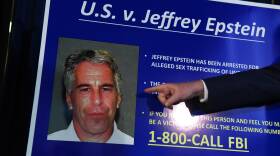EXPLORE MORE
Wednesday on BPR, live from the BPL:
Volker Türk, United Nations high commissioner on human rights
Harvard national security expert Juliette Kayyem
GBH executive arts editor Jared Bowen
State auditor Diana DiZoglio
Recent segments
-
Judge Denies Request To Dismiss AG Healey's Lawsuit Against Purdue Pharma
A judge has denied Purdue Pharma's motion to dismiss Attorney General Maura Healey's lawsuit against the company. -
Baker Says His Office Was Unaware Of Problems At RMV
“If I had known about it I would have fixed it, and once I did know about it I did,” Baker said. -
Bowen: Fans Of The Show Will Love 'Downton Abbey' The Film
After four years off the air, fans of “Downton Abbey” will be able to revisit the Crawley when the film of the same name opens in theaters on Thursday. -
Juliette Kayyem: Robert O’Brien Was Chosen 'Because He’s Mike Pompeo’s Guy'
“There’s no reason to believe that’s where his skill is,” Juliette Kayeem said of President Donald Trump’s choice for national security adviser. -
Leung: MIT Had To Know What Jeffrey Epstein Did When They Took His Money
MIT president L. Rafael Reif said the university was unaware of Jeffrey Epstein's sexual misconduct when they took his money. -
Report: Student Suicides Are On The Rise, But Schools Don't Track Them
Investigative reporter Jenifer McKim discussed her latest piece.
Listen to previous shows
-

BPR Full Show 04/10/20: This Is A Citizen's Arrest
Today on* Boston Public Radio:* We opened the lines to hear from listeners about how best to enforce stay-at-home orders. Boston Globe business columnist Shirley Leung discussed the pandemic's effect on the local economy, especially small businesses. WGBH's Emily Rooney was back with her famous list, and more. Boston City Councilor Andrea Campbell discussed how COVID-19 is disproportionately hitting minority communities nationwide, including some in her district. We closed out the show by opening the lines to hear from listeners again, about their experiences with life in the age of coronavirus. -

BPR Full Show 4/8/20: The Brace
Today on Boston Public Radio: We opened lines to ask listeners: do you feel guilty going to grocery stores and putting clerks at risk? MIT economist Jon Gruber explained why he believes the stimulus package’s $100 billion for hospitals won’t be enough. CNN analyst Juliette Kayyem discussed the string of inspector general firings by President Trump, and the resignation of Navy Secretary Thomas Moldy. Medical ethicist Art Caplan discussed proposals for how hospitals will ration care under the stress of the current pandemic, and troubling racial disparities in COVID-19 deaths. Cannabis reporter Dan Adams explained why many recreational pot shops are at risk of shutting down for good, and discussed his reporting on the mutual aid groups springing up around the state to help people in need. WGBH Arts Editor Jared Bowen discussed how various theater companies are adapting to social-distancing, uploading shows online and offering opportunities to talk one-on-one with actors over the phone. We opened our lines to talk with listeners about the end of Bernie Sanders' presidential bid. -

BPR Full Show 4/7/20: Freeze Dried Stroganoff & Other Quarantine Hacks
Today on Boston Public Radio: We opened lines to ask listeners whether you’re also addicted to the president's daily coronavirus briefings. NBC Sports Boston reporter Trenni Kusnierek recapped a husband’s tragic bungle of his wife’s virtual triathlon, and weighed in when sports might make their return to the U.S. Carol Rose from the ACLU of Massachusetts spoke on how the coronavirus pandemic is impacting the U.S. court system, and discussed the ongoing debate over whether to release certain prisoners to protect them from COVID-19. Travel writer Christopher Muther discussed whether U.S. airlines deserve the $50 billion bailout they’re asking for, and reviewed some freeze-dried meals to try while you’re social-distancing. CNN’s John King discussed Tuesday’s Wisconsin primaries and why they’re still happening, as well as what we could see in future stimulus packages from Congress. We opened our lines to ask: one month into quarantine, what have you learned you can live without? -

BPR Full Show 4/6/20: The Queen's Speech & The Fight At Home
Today on Boston Public Radio: Dr. Vanessa Kerry, founder and CEO of Seed Global Health, talked about the week ahead in the COVID-19 crisis, and took questions from callers. WGBH News analyst and GroundTruth Project CEO Charlie Sennott discussed Sunday’s coronavirus address from Queen Elizabeth II, and news of a Russian doctor who was detained for criticizing the Kremlin’s COVID-19 response. TV expert Bob Thompson weighed ethical concerns surrounding CNN anchor Chris Cuomo’s interviews with his brother, New York Gov. Andrew Cuomo, and talked about the launch of the short-form streaming service Quibi. Former U.S. Labor Secretary Robert Reich discussed his latest book, titled “The System: Who Rigged It, How We Fix It.” We opened our lines to talk with listeners about the role and value of socialism, and whether it’s been elevated in the midst of the coronavirus pandemic. Poet Richard Blanco joined us for a social distancing-themed edition of "The Village Voice." -

BPR Full Show 4/3/20: Friday, I'm Inside
Today on Boston Public Radio: We opened lines to talk with listeners about the financial strains brought by the coronavirus pandemic. Tech writer Andy Ihnatko discussed how weak or nonexistent internet access is exacerbating the COVID-19 crisis for low-income Americans, and reviewed medical tech for those looking to monitor their health from home. *Beat the Press *host Emily Rooney talked about the Patriots plane that brought medical supplies to Massachusetts from China, and recent sexual assault allegations made against Joe Biden. Food writer Corby Kummer discussed the toll that COVID-19 is taking on the food and restaurant industry, and the resurgence of Americans raising chickens. Media maven Sue O’Connell criticized Jared Kushner’s handling of the coronavirus pandemic, and drew parallels between our current situation and the AIDS crisis. *Under the Radar *host Callie Crossley discussed misinformation about coronavirus on Fox News, and technology that companies are using to spy on employees working from home. We re-opened our lines to callers to continue the coronavirus conversation. We aired live audio from Gov. Charlie Baker’s Friday press conference.









